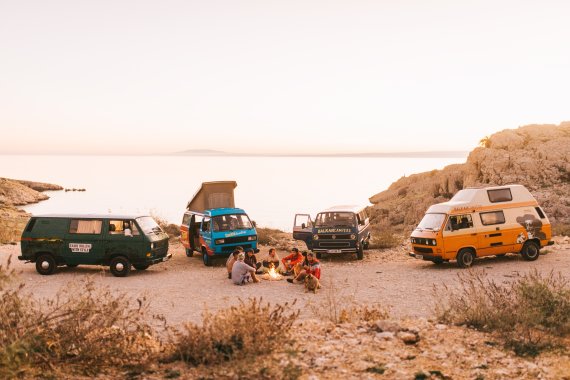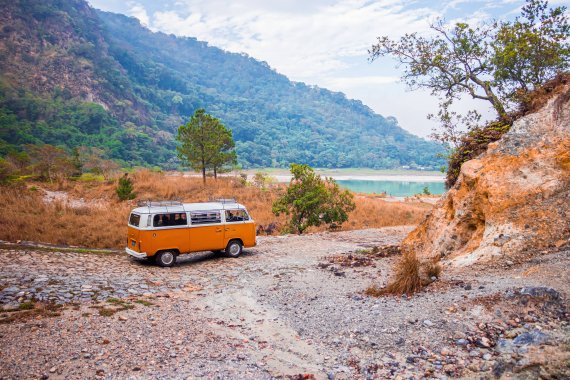
As bitter as it sounds, if you look at the numbers, our lifestyle in general is not sustainable. Most people consume more than 2.2 tons of carbon dioxide per year and person - the guideline value that could achieve the climate targets. The actual emissions of a German are on average more than five times higher. Frequent travelers are even significantly above this value at around 16 t CO₂/year. If you are curious and would like to calculate your own value, you can do so with various Footprint calculators, for example on Myclimate.
Camping is also reflected in this balance. Mobility contributes, among other factors, a high part to the consumption of one or everyone, of course also when traveling. Transportation and movement cause emissions, particulate matter and, for example, microplastics through tire wear, which ultimately end up in nature.
At first glance, camping in a bus, van or camper van consumes fewer resources than other trips, because you save on the flight and live in a confined space instead of staying in an expensive hotel with a heated pool, sauna and air-conditioned rooms. But at the latest when the water bottle or the tank in the van is empty, you very quickly become aware of your gas and water consumption. Travel is also always inevitably associated with consumption and hits the resource balance when you're on the road with a combustion engine.

If you want to live more sustainably, you first have to become aware of your own behavior, in everyday life as well as when camping. Often, a more environmentally friendly vacation requires a bit more planning and forethought than just going for it. This includes, for example, planning the most efficient route possible as well as knowing and following the waste separation system in the vacation country. Even if waste separation is simply part of the routine at home, everything often ends up in the same big bag on vacation, whether out of ignorance or convenience.
Anyone who has ever had to keep house with a water tank knows one or two tricks when dealing with drinking water. Buying water in plastic bottles sounds more sensible at first to delay the next refill - but it doesn't save the environment. Saving water and using alternatives instead isn't always the right answer either. Cleaning products and wet wipes use far more water and other resources in production than a little lukewarm water and a rag do.
This awareness of gas and water consumption in the van can also have a positive impact on normal life at home. Perhaps on vacation, people have become accustomed to shorter showers at lower temperatures, or to economical consumption when cooking with a gas stove. In general, the goal should be to reduce one's own consumption of resources - whether in the van or at home.

Many amenities like air conditioning, heating, or even the flat screen in the camper consume a lot of electricity and gas - so if you can do without, that's definitely the greener option. In general, a more sustainable vacation means doing without or reducing some things.
It starts with the choice of itinerary. Short vacations can be spent in nature not far from home, and you don't have to travel hundreds of miles for the camping experience itself. If you do want to go further away, campers should take their time. It is better to travel slowly and consciously experience individual places and stations of the journey than to cover as many kilometers as possible and just briefly tick off a sight everywhere.
Informing yourself, reducing where possible and offsetting when there is no other way makes your vacation a little greener. Climate compensation should not be a free ride, but should be used as a support to offset one's own consumption.

Traveling in a completely sustainable manner usually fails when it comes to purchasing a vehicle with an internal combustion engine. Nevertheless, environmentally conscious travelers can already start here. For example, it doesn't always have to be a van. According to a study by the IFEU the greenhouse emissions caused by the production of a new campervan or motorhome are significantly higher than those of a car. Projected over the years of use, this results in a not inconsiderable consumption. The larger the van, the higher the emissions. Especially if you are only two or even alone on the road. With a used camper, the resources of production are saved compared to a new vehicle, but vehicles that are getting on in years emit more pollutants.
If one already has a camper, private platforms make it possible to rent it out to others so that the vehicle is not just sitting around outside of one's own vacation. In return, van renters can be happy about being able to travel in a more resource-friendly way. And even if nothing can be found on private platforms, commercial rentals can be an option that has a better impact on the carbon footprint.

In addition to the production and consumption of the vehicle, the behavior of the campers is also important. Even small trips and micro-adventures not far from home can have an unnecessary impact on the environment. If they stick to the basics for responsible vanlife, campers can often avoid harm.
Campfires, for example, should only be lit in designated areas and should be carefully extinguished. Especially in the dry summer months, when the risk of forest fires increases, you should find out in advance what is possible in good conscience.
Another important point: The fact that human feces fit into the cycle and are decomposed in the forest just as easily as it is the case with forest animals is unfortunately not entirely true. Urine is less of a problem, as long as it is not in large quantities and as long as no medication is taken. Even with birth control pills, however, caution should be exercised when peeing in the wild, because the hormones can harm fish and amphibians.
Especially near bodies of water should be kept away from it. And the same applies when showering, brushing your teeth or washing up, even if you use ecologically degradable soap and dishwashing liquid.
Camping toilets should only be emptied where they are intended to be. This does not include streams or rivers, or the campground sink where the next person might want to brush their teeth. At the campsite and at some gas stations there are usually special facilities.
As nature-loving as van life appears in the social media, it also always depends on the individual and his or her behavior. With sensitivity and planning, even a trip with a camper can become greener and at the same time have positive effects on everyday life afterwards through increased environmental awareness.
 SustainabilityReady for the Green Deal? An Update for the Sports Industry
SustainabilityReady for the Green Deal? An Update for the Sports Industry
- Awards
- Mountain sports
- Bike
- Fitness
- Health
- ISPO Munich
- Running
- Brands
- Sustainability
- Olympia
- OutDoor
- Promotion
- Sports Business
- Textrends
- Triathlon
- Water sports
- Winter sports
- eSports
- SportsTech
- OutDoor by ISPO
- Heroes
- Transformation
- Sport Fashion
- Urban Culture
- Challenges of a CEO
- Trade fairs
- Sports
- Find the Balance
- Product reviews
- Newsletter Exclusive Area
- Magazine



